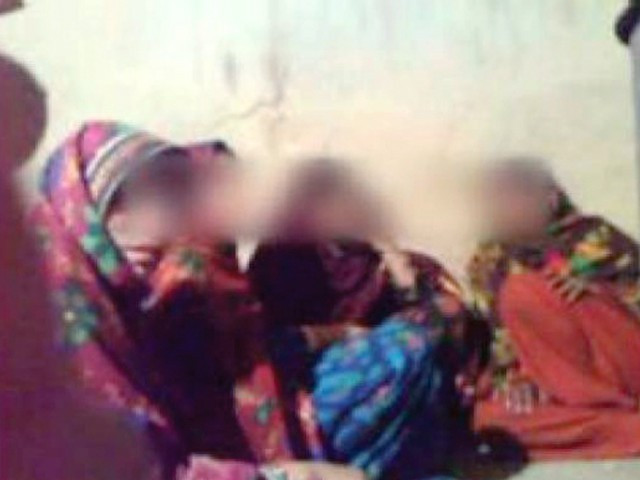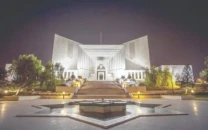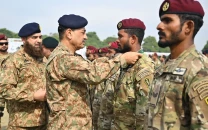Kohistan 'honour' killing: Four years on, no justice in sight
Sharmeen Obaid-Chinoy's documents what ensued after video of men and women singing and dancing emerged in Kohistan

Four women of the Azadkhel tribe were filmed singing and clapping while two boys belonging to the Salekhel tribe were dancing during a wedding ceremony in 2012.
It all started after shaky footage, seemingly shot on a mobile phone, showing a group of young women clapping and singing as two men danced during a wedding ceremony in 2012, became public.
Following this, a Jirga, comprising 12 elders, reportedly sentenced four women, a minor girl and the two boys in the video to death.
It was reported that the four women and the minor girl were killed on May 30, 2012 in accordance with the Jirga’s decree. However, their bodies were never recovered. The men in the video are said to have gone into hiding, but three of their elder brothers were tracked down and killed.
Another one of their brothers, Afzal Kohistani, is on the run and still seeking justice.
In Pakistan, ancient and modern justice collide
In a patriarchal society like Pakistan, where women bear the burden of a family’s ‘honour’ and cases of honour killing are rarely reported, Afzal’s story made headlines.
 Afzal Kohistani, brother of the boys in the video.
Afzal Kohistani, brother of the boys in the video.He recently appeared in a documentary produced by Academy Award- and Emmy Award-winning documentary film-maker Sharmeen Obaid-Chinoy. Recalling what aggravated the situation that ultimately resulted in the killing of his brothers along with the women in the video, Afzal said, “What made them really angry was that the boys were dancing while girls clapped, and above that, the video was made public. They felt that it brought shame upon them.”
Besides Jirga declaring that the boys’ family along with the girls should be killed, Afzal said residents of Kohistan added fuel to fire by instigating the girls’ family to take revenge. He added that the girls’ families wanted them dead. “They were tortured and kept locked up for almost a month before being killed,” he added.
Second fact-finding mission returns with more questions than answers
He also claimed that after killing his brothers, the perpetrators wanted to burn their bodies. “I’ve tried everything to avenge my brothers’ deaths. But I’m not in a position to do much. I just want them to get punished so that our future generations do not have to suffer like this.”
Behind the smoke screen
After the case made headlines, a fact-finding mission was sent to Kohistan to look for the girls. Two girls were presented before the mission, but a member, Dr Farzana Bari, believed that the girls were imposters.
The opinion was not an unpopular one as investigative journalist Haseeb Khawaja, also featured in the documentary, expressed his doubts as well and vowed to expose all the cover-ups.
 Haseeb Khawaja, a journalist, investigating into the incident.
Haseeb Khawaja, a journalist, investigating into the incident.Khawaja believes that this is not the first time such an incident has occurred in the area, and that the findings of the mission were also botched. “They (the mission members) didn’t know the local language and hired an interpreter who happened to be one of the alleged perpetrators,” he said. Further, he claimed that the girls whom the mission met and the ones in the video are not the same.
To support his argument, Khawaja sent a photo of the girl from the video and the one provided by the mission for facial recognition to a lab. The result showed that there is only a 14% resemblance between the two pictures, he claimed.
Khawaja also alleged that the head of the Jirga had called from his personal number and threatened him. “You’re an outsider, what do you have to do with this? Don’t try to challenge our centuries old traditions; it won’t be good for you,” he quoted him as saying.
Since receiving the threatening call, Khawaja claimed he has been attacked.
‘Allegations are baseless’
Maulana Javed, believed to be the head of the grand Kohistan Jirga, has refuted all allegations implying that he issued a decree calling for the killing of the girls.
“This kind of fatwa is illegal. It is not only forbidden in our religion but in all four religions,” he maintained, adding that such claims should be proved.
The cleric insisted the girls were alive, and were produced before the commission. Responding to a question as to why the girls did not appear before the court, he said, “Our girls don’t go to courts or police stations.”
 Maulana Javed, who is believed to be the head of the grand Kohistan Jirga.
Maulana Javed, who is believed to be the head of the grand Kohistan Jirga.Further, he alleged that Afzal was lying and had ulterior motives. “I’ve read in newspapers that he wants to leave the country. He wants to prove that his life is in danger here so either the government or human rights activists take him elsewhere.”
Kohistan complexities
Javed said it is against local tradition for girls and boys to hang out together. “Na-Mehram (non-blood relatives) cannot hang out together. This is prohibited.”
If anyone is seen hanging out with a non-mehram, he is called “Kandal Chor”, he added.
“The punishment for such a person is that he should be injured in some small way,” the cleric maintained, “We say nothing to the girl, only if a man is punished.”
Life on the run
For Afzal, life has become increasingly tough. He has been on the run since his brothers were killed and his family is scattered across the region, and also in hiding.
“There was a time when I became really disheartened, especially when the Supreme Court verdict did not rule in our favour. I wanted to pick up arms to avenge my brothers. But I didn’t want to take the law into my own hands,” he said.
Every few days, Afzal has to take almost half-a-day-long journey to his family’s secret hiding place to check on them.
The desire to go back to their home is evident on the faces of Afzal’s family. Afzal’s brother says he wants to go back to Kohistan but fears that he will not be spared. “It is better to die than to live in the kind of house we are living in right now,” he said.



















COMMENTS
Comments are moderated and generally will be posted if they are on-topic and not abusive.
For more information, please see our Comments FAQ